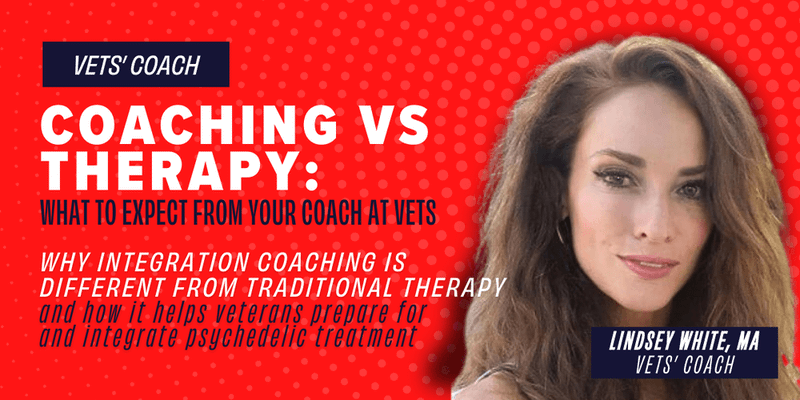By Lindsey White, M.Ed., VETS Prep and Integration Coach and Retired Licensed Psychotherapist (Texas License #62731)
When you step into the world of Ibogaine and 5-MeO-DMT, you’re entering a different kind of healing experience compared to traditional talk or trauma therapy. Many veterans are familiar with therapy or counseling, but fewer understand what a psychedelic integration coach does and how this differs from therapy.
What is the Distinction Between the Two?
Understanding these differences is key to setting realistic expectations, clarifying roles, and making the most of your healing journey.
Therapy: The Healing Power of the Relationship
In traditional therapy, the relationship between therapist and client is often the main driver of change. The trust, safety, and understanding you build together can be incredibly healing. Your therapist is trained to listen, reflect, and provide insights that help you work through painful experiences, resolve old wounds, and learn new ways to relate to yourself and others.
In this setup, the therapist is the “change agent.” Their expertise and the bond you form with them are central to your growth. While various techniques and tools are used, it’s really the relationship that fosters healing.
Coaching: The Process as Your Guide
Preparation and Integration coaching takes a different approach. While building rapport and trust with your coach is still important, the coach isn’t the healer… you are. In the context of Ibogaine and 5-MeO-DMT, the plant medicine itself is the main catalyst for transformation.
At VETS, coaches act as guides. They’re not there to “fix” you or repair you through the relationship. Instead, they help you connect with the plant medicine so that your own inner healer can do the work. Ibogaine helps reorganize your neural pathways, brings insights to the surface, and reveals the unconscious material that’s ready for healing. Your coach prepares you for this journey, walks alongside you, and helps you make sense of what unfolds, without getting in the way of your direct relationship with the plant medicine.
Generative vs. Reparative Focus
To put it simply:
- Therapy is generally reparative. It focuses on healing wounds, resolving trauma, and creating corrective emotional experiences within the therapeutic relationship.
- Coaching is generative. It’s about creating clarity, skills, and strategies to help you engage more fully with your healing process, especially in the context of Ibogaine and 5-MeO-DMT.
Your coach won’t conduct therapy and they won’t diagnose or treat symptoms. Instead, they’ll help you prepare mentally, emotionally, and spiritually to meet the medicine. After your journey, they’ll guide you in understanding and integrating your experiences into your daily life, ensuring that the healing initiated by the medicine continues long after your session.
Why This is Important for Veterans
Many veterans turn to Ibogaine or 5-MeO-DMT after years of therapy that may have only scratched the surface. You might have spent a lot of time discussing trauma but still felt stuck. Psychedelic plant medicine offers a different approach: it goes deeper, accessing layers of memory, conditioning, and pain that are often hard to reach with words alone.
The medicine itself is what drives deep change, activating your natural ability to heal. However, navigating these powerful experiences can be complex, and that’s where your coach comes in.
What Your Coach at VETS Will Do
A coach at VETS will:
- Help you set your mindset and intentions before treatment.
- Provide tools and practices to navigate challenging moments during the process.
- Support you afterward as you make sense of what you experienced.
- Offer accountability and structure as you apply the lessons of the journey to your life, relationships, and future goals.
While the relationship with your coach is important for building trust and safety, the focus is always on your direct connection to the medicine and your own healing, rather than the relationship with the coach as the source of transformation.
The Unique Value of VETS Coaching
Coaches at VETS have backgrounds as trained therapists, bringing a wealth of knowledge and experience in supporting trauma survivors, including veterans. However, when they step into the role of coach, they take a different approach:
- They create space for you to access your own wisdom instead of analyzing or interpreting your experience for you.
- They guide you toward self-trust and independence rather than dependence on the therapeutic relationship.
- They focus on your process rather than pathology, helping you chart a new course after your Ibogaine and 5-MeO-DMT experience.
Their goal isn’t to repair you. Instead, they’re there to help you meet the plant medicine, receive its insights, and carry those lessons into the next chapter of your life.
Bottom Line
Both therapy and coaching have their own value, but they serve different purposes. In therapy, the relationship itself is the vessel for healing. In psychedelic integration coaching, the medicine is the healing agent, and your coach is a skilled guide helping you navigate the process so you can unlock your own inner-healer.
If you’re a veteran preparing for an Ibogaine and 5-MeO-DMT journey with VETS, expect your coach to stand beside you, not as your therapist, but as a trusted ally while the plant medicine and your own psyche do the deep work.

